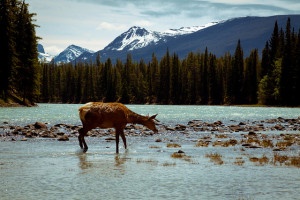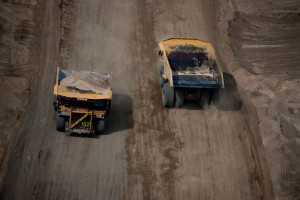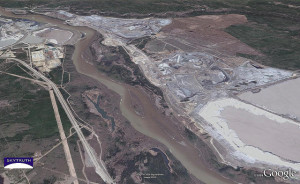We have much more to do and your continued support is needed now more than ever.
Shell’s Oil Sands Project will Devastate Habitats, but Canada Says OK

Five and a half years ago, Royal Dutch Shell applied to expand its Athabasca Oil Sands project in Alberta. The proposed Jackpine mine expansion will increase daily production from 255,000 to 355,000 barrels—a massive undertaking that will decimate an enormous swath of boreal forests, have severe impacts on wildlife, air and water quality, and jeopardize the health of surrounding Aboriginal communities. To get a sense of how harmful this project is, just ask the Joint Review Panel Established by Canada’s federal and provincial regulators charged with protecting the public and natural resources at risk:
The panel finds that the project would likely have significant adverse environmental effects on wetlands, traditional plant potential areas, wetland-reliant species at risk, migratory birds that are wetland-reliant or species at risk, and biodiversity. There is also a lack of proposed mitigation measures that have been proven to be effective.
But shockingly, these regulators still declared that Shell’s proposal is in the “public interest:”
The Project would provide notable economic benefits for the region, Alberta, and Canada. Although the Panel finds that there would be significant adverse project effects on certain wildlife and vegetation … the Panel considers these effects to be justified and that the project is in the public interest.
Apparently to Canadian officials, the public interest means big oil’s interest.

And Canada has agreed to protect this wildlife. At least 130 migratory bird species that breed in, or migrate through, habitat located in the tar sands area are protected by treaties between the U.S. and Canada and laws intended to carry out those treaties. Those species include water and shore birds such as cranes, ducks, geese, sandpipers, egrets and herons, as well as the song birds that fill the spring air with the melodies. One of the species that migrates right over tar sands production is the critically endangered whooping crane. There are less than 400 cranes living in the wild.
And how significant are the adverse impacts from tar sands? Staggeringly significant. If the industry has its ways, the effects of tar sands mining and drilling on bird habitat are projected to reduce the forest-dependent bird population by between 10 to 50 percent. Strip mining of the 1,200 square miles currently allocated for mines will destroy habitat for an estimated 480,000 to 3.6 million adult birds. Drilling infrastructure could eliminate or fragment another 19,000 square miles of migratory bird habitat. Tar sands operations will also reduce bird births, with one estimate ranging from 9.6 million to 72 million fewer birds being born over a forty-year period.
While Canada might be willing to ignore such impacts to pad the pockets of oil companies, the U.S. Department of Interior, which is charged with protecting wildlife, is not at liberty to turn a blind eye towards Canada’s wildlife failings. Under a law called the Pelly Amendment, when the Secretary of the Interior finds that nationals of a foreign country, directly or indirectly, are taking action which diminishes the effectiveness of any international program for endangered or threatened species, the Secretary making such finding shall certify such fact to the President. The President may then choose to impose sanctions. Unlike the Canadian decision on the Shell’s Jackpine mine expansion, the Interior Secretary must base her finding on conservation factors alone.

These impacts to wildlife life and migratory birds are yet another reason the President must deny the Keystone XL pipeline. For the same reasons that the pipeline will spur climate change, it will also directly impact wildlife Americans observe, hunt and enjoy by enabling further devastating tar sands production.
As for the Jackpine mine, regional officials in Canada still need to decide what to do with the panel’s statement, and whether to allow the expansion to begin. The messages that they hear between now and then may prove to be pivotal. Mine expansions like Jackpine make little sense if there is no market for dirty tar sands. The Obama Administration can send Canada a clear signal by denying the Keystone XL pipeline and the export market it provides, keeping the tar sands landlocked and certifying Canada as harming protected wildlife. Oil profits aren’t in the public interest; wildlife and people are. If Canadian officials won’t stand up for our children’s future, we must.





















